Nuts and Bolts
Darlaston is best known for its nuts,
bolts, and fastenings which were made in vast quantities in
large factories, employing thousands of people. It is not
known when the industry began in the town, but it appears to
have its origins in the early nineteenth century.
Originally nuts and bolts
were forged by blacksmiths on an anvil using only a hammer
and a few simple tools. The bolts had square heads with
bevelled corners which were known as ‘Gothic’ heads. It
seems likely that the early manufacturers adopted a simple
device used by nail makers, called the ‘devil’ which
consisted of a two-part casting with dies in the upper half
that were closed by treadle-operated toggles. The heated
bolt rod was gripped between the dies to form the head, and
upset by the hammer into the recess provided. The mechanism
was then modified into a form that would work with the
‘oliver’ treadle-operated hammer, that had been in use since
the middle ages
|
|

Using an 'oliver' hammer at Charles
Richards & Sons. |
Although nut and bolt makers do not appear in local
trade directories until well into the nineteenth century,
many screw makers can be found in early nineteenth century
editions.
It may be that some of them began making nuts and bolts,
an industry which almost certainly began in small backyard
workshops. |
| The 1851 census
states that Thomas Wilkes of 26 Blakemore Lane was a bolt
forger. His son, aged 16, was also a bolt forger, and his
wife and two daughters aged 14 and 12 are described as screw
wormers, who probably cut the threads on the bolts and nuts.
This would have been a family business with a small backyard
workshop, similar to the ones used by the nailers. |
|
One of the largest, most successful,
and longest surviving nut and bolt manufacturer was F. W.
Cotterill. The business was founded by Alexander Cotterill
in about 1800. In 1802 he was referred to as a coach bolt
maker, and by 1818 was listed as a tool maker at Butt Croft
Works, where he produced ‘setts’, tools fitted to anvils and
treadle hammers.
In 1834 he was listed as a maker of
buckles, coach, bed and machine screws, and in 1835 as a
screw manufacturer. In 1845 he produced coach and railway
carriage bolts, and around 1850 became a machine bolt maker.
By 1851 he employed 26 people. After his death in the 1850s
his son Frederick took over. Frederick installed the latest
powered machines, and the firm rapidly grew in size. He is
listed in the 1861 census as an employer of 75 men. The
census lists another 64 firms making nuts and bolts in the
town, but none of them employed more than twenty people.
In the 1860s Cotterills were also
manufacturing machines. At the time, the expanding railways
needed large quantities of nuts and bolts, and so the
industry rapidly grew.
In 1874 Frederick Cotterill died, and
the business was taken over by J. E. Wilson and J. Slater.
In the same year the firm moved to Atlas Works in Station
Street, and in 1880 the business became a private limited
company. |
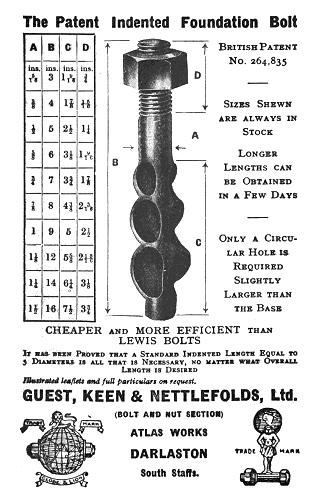
An advert from 1936. |
| Ten years later, Tom S. Peacock became Managing
Director, and in 1912 the firm acquired the forging works of
John Garrington and Sons. In August 1919 the whole concern
was taken over by Guest, Keen and Nettlefolds, who
eventually acquired a number of Darlaston’s nut and bolt
manufacturers. By the end of the Second World War,
Atlas Works covered more than 20 acres and employed about
3,000 people, and their nuts and bolts were sold world wide. |

The finishing shop at Atlas Works.
|
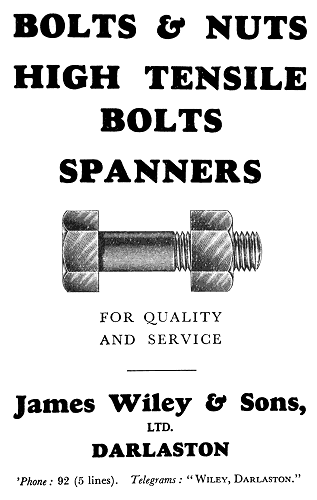
An advert from 1943. |
|
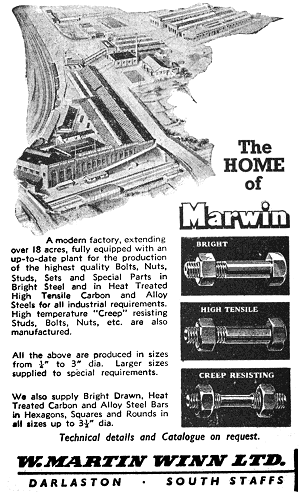
An advert from 1960. |
|
|
Darlaston had a large number of
factories producing all kinds of nuts, bolts and fastenings,
including:
The Darlaston Bolt & Nut Company.
David Etchells & Sons Limited, Bull
Piece Works (also produced machinery etc.).
Horton & Son Limited, Alma and New Alma
Works.
Thomas Mayer & Company Limited, Crown
Nut & Bolt Works.
Nuts & Bolts (Darlaston) Limited.
Charles Richards & Sons Limited,
Imperial Works.
J & R Rose Limited, London Works.
Staffordshire Bolt, Nut & Fencing Co.
Limited, London & North Western Works.
The Steel Nut & Joseph Hampton Limited,
Woden Works.
James Wiley & Sons Limited, Eagle Works.
Wilkes Limited, Grand Junction Works.
Enoch Wilkes & Company Limited,
Britannia Works.
W. Martin Winn Limited, Station Works.
And many, many more.
Although most of the nut and bolt
manufacturers are long gone, a few remain, including Alca
Fasteners Limited, in Salisbury Street, and Kebrell Nuts &
Bolts Limited, in Heath Road.
|
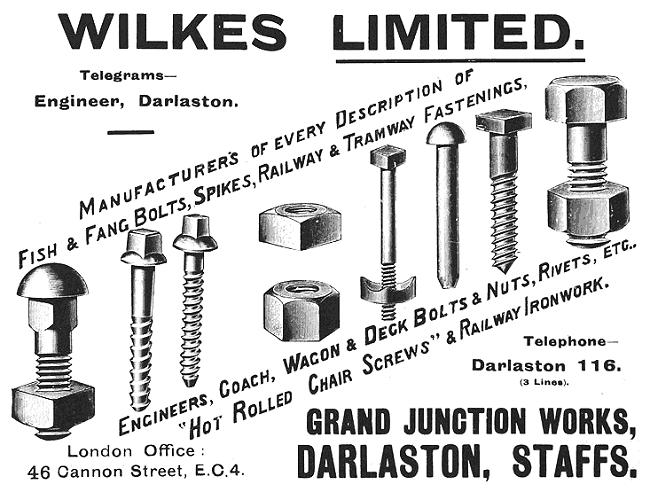
An advert from 1930.
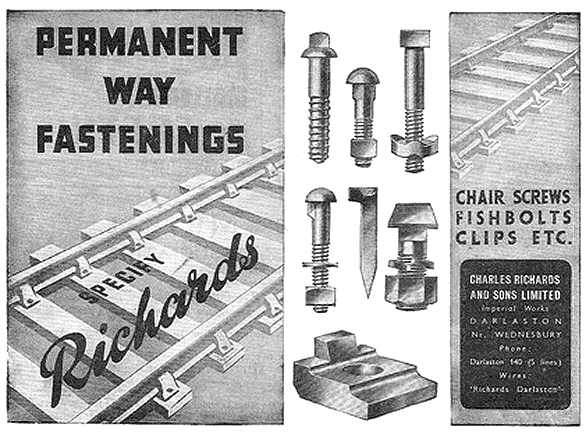
An advert from 1949.
 |
|
 |
|
 |
Return to
Heavy Industries |
|
Return to
contents |
|
Proceed to Other
Heavy Industries |
|